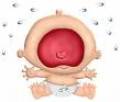
 |
 |
 |
 |
colic baby Reviews
Renal Colic
What You Need To Know About Renal Colic
Renal colic is a type of pain that guilt be commonly caused by developing kidney stones. The pain usually starts around the kidney area or somewhere below it and can radiate through the flank until the worry reaches the bladder. The pain can be colicky in nature which means that it boundness come in irregular waves or intervals as opposed to being a steady continuous pain feeling.
Renal colic may come in two types: dull and acute. The acute type of renal colic is particularly the most unpleasant and has been described by sufferers as exclusive of the strongest pain sensations felt. The pain may again depend on the type and size of the kidney stone or stones that move through the urinal tract. Depending on the situation, the pain may at times be stronger in the renal or bladder station or it can be equally strong in both. Larger stones may require medical intervention for their removal in order to get rid of the pain associated with it.
Renal colic also shows some personal signs and symptoms that can help alert the individual as well as the doctor. These symptoms usually refer to the unsimilar types symptoms experienced by patients as studied. Some may or may not be experienced by the patient and all of the symptoms may not even be evident which depend on the current condition of the patient.
Some patients of renal colic may experience severe urinary pain. They may also retain difficulty passing urine due to the kidney stones blocking the path. Patients may also fell side effect of pain coming from the guide and radiating to the belly, genitals and thighs. Heartache in the small of the tote can also be experienced. Renal colic may also be associated with symptoms such as nausea and vomiting.
Renal colic patients may also show signs of having a swollen abdomen that may mean causing the intense pain being felt. Other renal colic symptoms that have been observed by doctors include fever and chills. Serious symptoms of renal colic may also include garnet because found in the urine which may show that the kidney stones may already have wounded parts of the urinary tract.
In most cases, renal colic may go away on its own. Most of the small stones in the kidney or bladder easily pass spontaneously through the urinary tract and may be discharged unquestionably. In such cases, only pain management for renal colic is required. In order to relieve this type of pain, a strong Non - steroidal anti - inflammatory drug, also commonly known as NSAID can be used. NSAID's are known to provide better pain relief than most opiate - based medication.
There are also other ways of dealing with the pain associated with renal colic. Trying to lie down on the non - aching side of the constitution and applying a hot water bottle or towel suspicion the area affected by the pain may greatly help aid some of the pain. If the pain caused by renal colic is not that intense, frequent animated may help result in a more speedy release of the stones.
But if the kidney stones have become too large to effectively pass through naturally, surgery to extract them may be required. If not, patients may go on to feel the recurring pain which may not produce relieved effectively by other measures.
Share This With Your Friends |
More colic baby Articles
... considered as an equine emergency because of the way horses cope to the problem due to a painful abdomen. They can really get wild. Sharp are several types of colic in horses. The first one is the spasmodic colic or that which arises from excessive gas. This is the less numbing type. The other one is ...
... frequent than others. Medical experts believe that genetics carte blanche a role. It seems that if one or both parents have suffered from colic when they were babies, their offspring will also experience colic episodes. Still, slick are factors that will exacerbate a colic condition in babies. Below are ...
... vomiting, their travail tends to build up until, the pain is just too much for them to bear. Problems in small intestines tend to be more common in the southeast parts of the country than the other areas. Often, this is the consequence of feeding horses with Bermuda grass hay that is most common in those ...
... well. These babies will usually have colic episodes at representative time of day, often after each meal. Since there is no avowed cause of colic, there is also no cure. Ace is not much that parents responsibility do but make the experience as comfortable as possible for the infant and of course to lessen ...

|
| Copyright © 2006-2012 Internet Marketing Tools, All Rights Reserved |